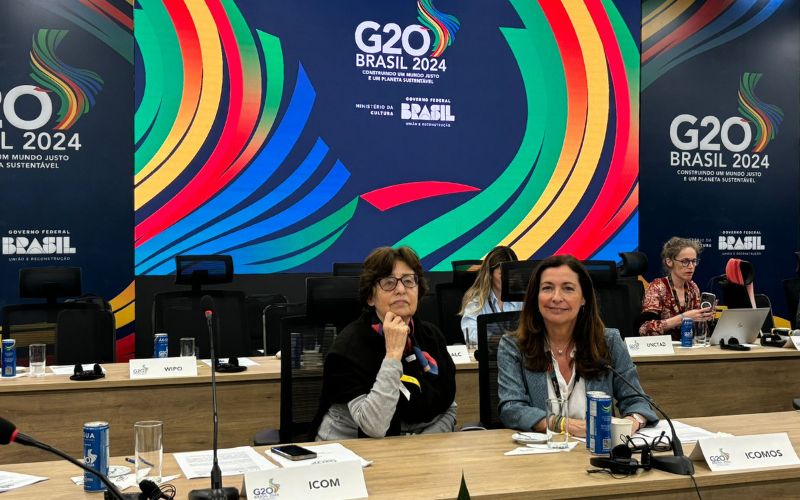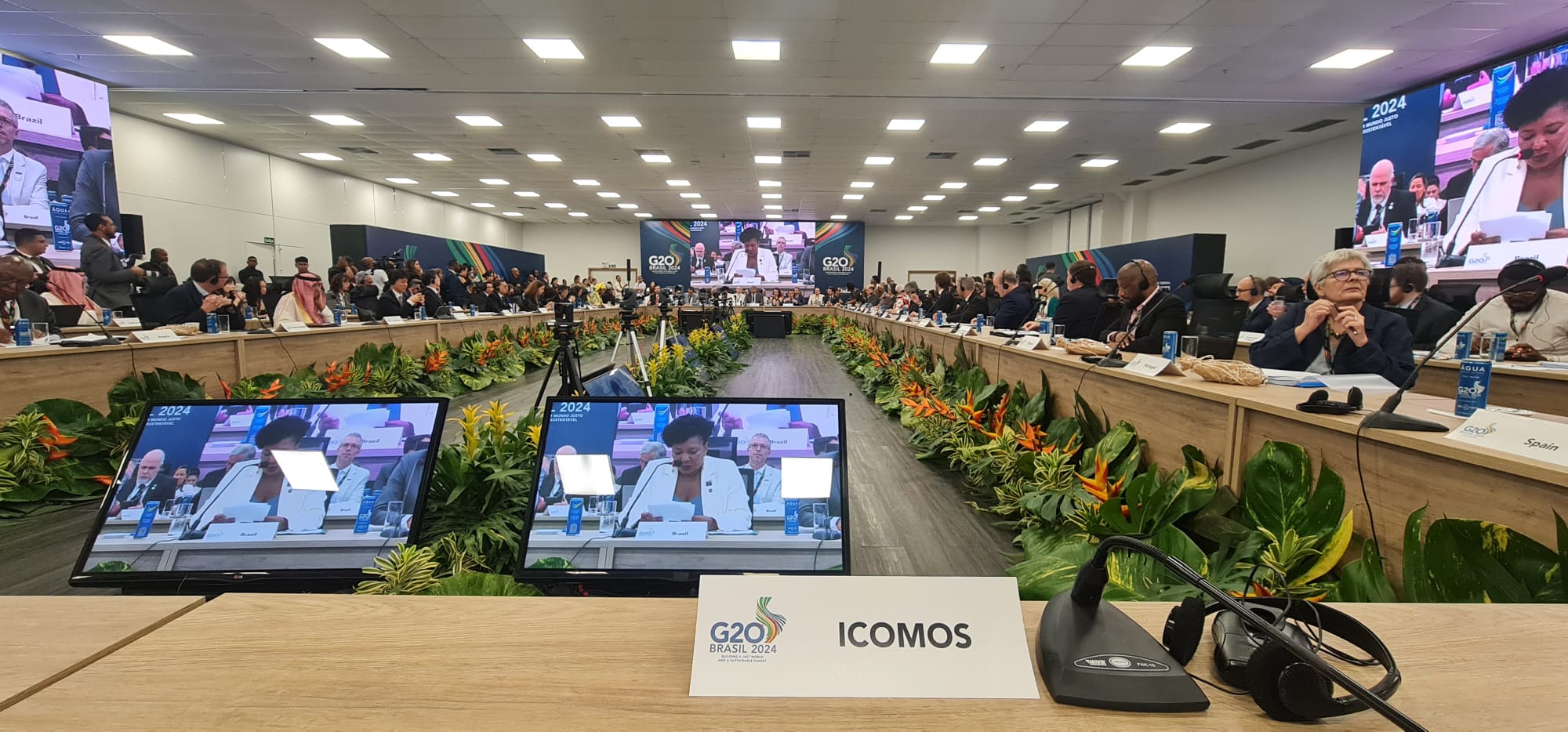ICOMOS Participation in the 2024 G20 Culture Working Group: Outcome Documents
 As part of the G20 Brazil Culture Working Group, ICOMOS participated in a series of meetings and events that led to the publication of the Salvador da Bahia Declaration of the G20 Ministers of Culture on 8 November, 10 days before the start of the 18th G20 Summit in Rio de Janeiro.
As part of the G20 Brazil Culture Working Group, ICOMOS participated in a series of meetings and events that led to the publication of the Salvador da Bahia Declaration of the G20 Ministers of Culture on 8 November, 10 days before the start of the 18th G20 Summit in Rio de Janeiro.
Based on the 2024 G20 theme 'Building a Just World and a Sustainable Planet', the Culture Working Group identified the following workstream priorities:
- Cultural diversity and social inclusion;
- Culture, digital environment and copyright;
- Creative economy and sustainable economic development;
- Preservation, safeguarding and promotion of cultural heritage and memory.
On the basis of these 4 priorities, the Salvador de Bahia Declaration emphasises the role of culture in fostering solidarity and sustainability. It sheds light on the need to protect cultural diversity and inclusive access to heritage, and raises concern over the destruction of tangible and intangible cultural assets as a result of climate change and disasters. It also underlines issues surrounding the increasing disappearance of languages around the world, the challenges posed by the development of artificial intelligence and related copyright problems, as well as concerns about illicit practices related to cultural heritage and the dangers they represent for Indigenous communities.
The Declaration serves as a global call to action for G20 leaders to develop policies and adhere to existing frameworks that aim to provide inclusive access to culture, better protect cultural assets, recognise culture as a fundamental element of sustainable development and promote international cooperation.
The ICOMOS taskforce was coordinated by Adriana Careaga (ICOMOS Board member) and involved the participation of members from ICOMOS Brazil, members of the ICOMOS Working Groups on Rights Based Approaches, Sustainable Development, Indigenous Heritage and Climate Action, and members of the ICOMOS International Scientific Committees on Economics of Conservation, Intangible Heritage, Heritage Documentation, Training, Aerospace Heritage, Archaeological Heritage Management, and Legal Issues - with the support of ICOMOS International Secretariat Director Gaia Jungeblodt.
A total of 4 Culture Working Group (CWG) meetings were held between March 2024 and November 2024, all of which involved the organisation of side events and seminars. 4 ICOMOS members contributed to the 1st meeting to give their insights and recommendations on the defined priorities:
Priority 1 / Emilia Stenzel (Director for the West Centre Region of ICOMOS Brazil) called for the development of strategies based on the respect of Indigenous knowledge and culture, and the funding of research on the development of new approachesto address climate challenges. She stressed that the world's rich cultural heritage is the result of diversity and social exchanges, and that this diversity must be protected as the basis for building resilient communities in the context of climate change. This priority was further discussed at the 'International Seminar on Culture and Climate Change', which was organised as a side event to the 4th CWG meeting in November.
Priority 2 / Barbara Hoffman (member of the ICOMOS International Scientific Committee on Legal issues) discussed the need to implement a legal framework to protect the rights of peoples to their own cultural identity and heritage. She urged G20 leaders to better recognise the holistic value of Indigenous culture and its natural environment, and to respect prior and informed consent of the involved communities before adopting policies or using, engaging with, and sharing Indigenous knowledge.
Priority 3 / Julio Sampaio (Vice President of ICOMOS Brazil) underlined the role of heritage as a lever for sustainable development and a driver of the creative economy. He called for G20 leaders to consider heritage as a resource for sustainable economic development and the use of popular knowledge as a tool to overcome extreme poverty. This priority was also the central focus of the 'International Seminar on Public Policy for the Creative Economy: G20 + Ibero-America', which was held in August as a side event of the 3rd CWG meeting.
Priority 4 / Karla Nunes Penna (member of the ICOMOS Working Group on Sustainable Development Goals) focused on the need to preserve culture to foster security and collective well-being. She also highlighted the crucial role of cultural heritage within social transformation and called for G20 leaders to act on the transmission of traditional knowledge and cultural expressions through community-led or intercultural competence programmes, and the establishment of strong legal frameworks to protect heritage from conflicts and natural disasters. This priority was also at the forefront of discussions at the G20 Cultural Heritage and Climate Change Side Event, during the 2nd CWG meeting in May.
This 2nd meeting also provided an opportunity for Emilia Stenzel to further discuss ICOMOS' recommendations by participating in a total of 7 sessions where she gave insights on behalf of the organisation around specific topics, including artifical intelligence, cultural rights, the economic impact of cultural activities or illicit trafficking.
The work of ICOMOS within the G20 Culture Working Group concluded with remarks by ICOMOS President Teresa Patrício at the 4th and last CWG meeting, followed by a speech delivered at the G20 Culture Ministerial Meeting on 8 November, reaffirming the organisation's commitment to the 4 priorities and key themes of the Salvador de Bahia Declaration.
![]() Download the Salvador de Bahia Declaration of the G20 Ministers of Culture, 8 November 2024
Download the Salvador de Bahia Declaration of the G20 Ministers of Culture, 8 November 2024
See more
![]() Read the G20 Rio de Janeiro Leaders' Declaration, 18 November 2024
Read the G20 Rio de Janeiro Leaders' Declaration, 18 November 2024
![]() 2023 G20 India Culture Working Group Meetings: Outcome Documents
2023 G20 India Culture Working Group Meetings: Outcome Documents

